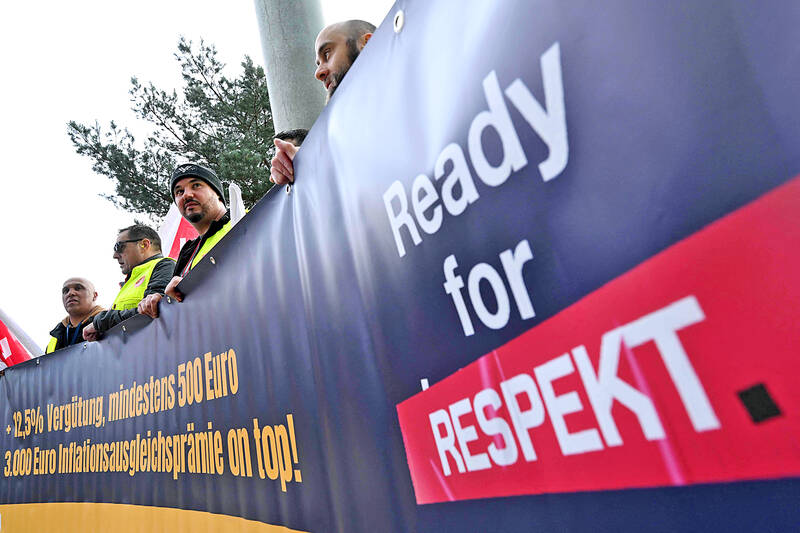Negotiated pay in the eurozone rose 4.5 percent at the end of last year, the European Central Bank (ECB) said yesterday, easing fears that rising salaries could sustain inflation above the target.
While still high, fourth-quarter pay growth is down from a eurozone record of 4.7 percent set in the previous three months, the ECB’s negotiated wage indicator showed.
The gauge — which signals possible pay pressures by crunching non-harmonized country data — had been more eagerly awaited than normal this time, as officials in Frankfurt, Germany, zero in on labor costs as a key factor in deciding when to cut interest rates.

Photo: AFP
However, many are even keener to see numbers for this quarter — due in May — before sanctioning a loosening of monetary policy.
“This slowing in wage growth at the end of last year should bring some relief that the feared wage-price spiral will not unfold in the eurozone,” said Carsten Brzeski, global head of macro at ING. However, “the ECB will definitely want to wait for first-quarter wage growth data before deciding on rate cuts. There’s no reason to change our call of a first cut in June.”
ECB President Christine Lagarde last week singled out salaries as “an increasingly important driver of inflation dynamics in the coming quarters,” while cautioning against “hasty decisions” on easing policy without assurance that price gains are headed back to the 2 percent target.
While a separate forward-looking ECB tracker of pay continues to signal strong pressures, agreements indicate some leveling off last quarter, Lagarde said.
In December last year, the ECB projected nominal wage growth would gradually decline to 3.3 percent in 2026 from 5.3 percent last year in terms of compensation per employee.
It expects pay increases to be limited as firms pass higher costs on to consumers at a slower pace.
However, while some officials see this happening, others — such as Austria’s Robert Holzmann — argues that companies are not likely to absorb rising wage bills.

Real estate agent and property developer JSL Construction & Development Co (愛山林) led the average compensation rankings among companies listed on the Taiwan Stock Exchange (TWSE) last year, while contract chipmaker Taiwan Semiconductor Manufacturing Co (TSMC, 台積電) finished 14th. JSL Construction paid its employees total average compensation of NT$4.78 million (US$159,701), down 13.5 percent from a year earlier, but still ahead of the most profitable listed tech giants, including TSMC, TWSE data showed. Last year, the average compensation (which includes salary, overtime, bonuses and allowances) paid by TSMC rose 21.6 percent to reach about NT$3.33 million, lifting its ranking by 10 notches

Popular vape brands such as Geek Bar might get more expensive in the US — if you can find them at all. Shipments of vapes from China to the US ground to a near halt last month from a year ago, official data showed, hit by US President Donald Trump’s tariffs and a crackdown on unauthorized e-cigarettes in the world’s biggest market for smoking alternatives. That includes Geek Bar, a brand of flavored vapes that is not authorized to sell in the US, but which had been widely available due to porous import controls. One retailer, who asked not to be named, because

SEASONAL WEAKNESS: The combined revenue of the top 10 foundries fell 5.4%, but rush orders and China’s subsidies partially offset slowing demand Taiwan Semiconductor Manufacturing Co (TSMC, 台積電) further solidified its dominance in the global wafer foundry business in the first quarter of this year, remaining far ahead of its closest rival, Samsung Electronics Co, TrendForce Corp (集邦科技) said yesterday. TSMC posted US$25.52 billion in sales in the January-to-March period, down 5 percent from the previous quarter, but its market share rose from 67.1 percent the previous quarter to 67.6 percent, TrendForce said in a report. While smartphone-related wafer shipments declined in the first quarter due to seasonal factors, solid demand for artificial intelligence (AI) and high-performance computing (HPC) devices and urgent TV-related orders

Prices of gasoline and diesel products at domestic fuel stations are this week to rise NT$0.2 and NT$0.3 per liter respectively, after international crude oil prices increased last week, CPC Corp, Taiwan (台灣中油) and Formosa Petrochemical Corp (台塑石化) said yesterday. International crude oil prices last week snapped a two-week losing streak as the geopolitical situation between Russia and Ukraine turned increasingly tense, CPC said in a statement. News that some oil production facilities in Alberta, Canada, were shut down due to wildfires and that US-Iran nuclear talks made no progress also helped push oil prices to a significant weekly gain, Formosa said